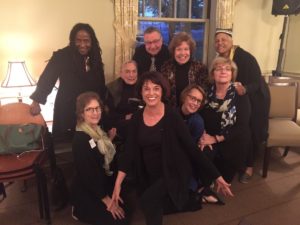 At the weekly rehearsals for our improv troupe, Wing & A Prayer Pittsburgh Players, we play a game we call, “What’s Up?” Someone starts a repetitive movement and everyone copies that movement until one of the people in the group decides to step into the center and take their turn. Their task is to answer the question “What’s Up,” or been prominent in their own life this particular week. This person tells a three-sentence story from their life and a movement emerges from that story that seems to underline it. That becomes the new repetitive movement we all do together.
At the weekly rehearsals for our improv troupe, Wing & A Prayer Pittsburgh Players, we play a game we call, “What’s Up?” Someone starts a repetitive movement and everyone copies that movement until one of the people in the group decides to step into the center and take their turn. Their task is to answer the question “What’s Up,” or been prominent in their own life this particular week. This person tells a three-sentence story from their life and a movement emerges from that story that seems to underline it. That becomes the new repetitive movement we all do together.
That movement continues till the next person takes their turn and tells us “What’s up?” in their life, changing the group movement to one that emerges from their story. I’ve always felt this was a great way to check in to the whole group by naming, claiming, and embodying a particular experience that stands out from our individual lives since we met last.
The items people mention span many issues and topics, both small and large. One person might describe an experience with a houseguest, another a run in with the cable company. One speaks of sore muscles after overdoing it in her garden. Another reports she just quit her job. Some weeks there are family celebrations to tell about like a baby shower, or a family tragedy like a nephew’s death in a car crash. When big community or global events happen, group members often come up with their own takes on those themes; an election result, a racist news story, a negative report on the air quality in Pittsburgh.
Through the years I’ve noticed the effect of this game or practice on us as individuals and as a group. For sure, we come to appreciate and honor our experiences and the experiences of one another. According to Maya Angelou, “Your life is more important than you think. It is your first treasure.”
And then, where does that take us? We seem called to notice or care about certain issues in the larger world, some we share and some we do not. One of my writing colleagues, Elizabeth Jarrett Andrews describes how she decides what to do next. She asks herself, “What do I see that no one else sees? What is born of my personality and circumstances and gifts and shortcomings – what rises up from my unique self so strongly that all self-doubt falls aside and I can’t help but act? That’s what is mine to do.” https://www.elizabethjarrettandrew.com/
I would add that having our life experiences witnessed, honored, and supported in our communal life shows us, not only what is ours to do individually, but it suggests what we might be able to do and accomplish together.

